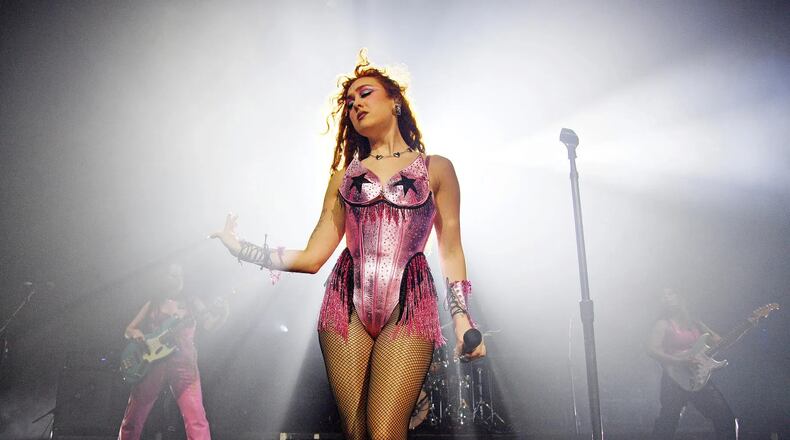This story was originally published by The 19th.
Chappell Roan announced last week that she had canceled two festival performances, shortly after the rising pop megastar faced backlash over her views on political endorsements.
“Things have gotten overwhelming over the past few weeks and I am really feeling it,” the 26-year-old singer wrote to fans after the cancellation. “I feel pressures to prioritize a lot of things right now and I need a few days to prioritize my health.”
In an interview with the Guardian in September, Roan said she did not “feel pressured” to endorse anyone for president, citing problems on “both sides.” Internet users began circulating out-of-context clips, prompting the first wave of political backlash. Last week, Roan posted a TikTok in which she tried to clarify her views and plans for voting: She intended to cast a ballot for Vice President Kamala Harris, but with the caveat that she did not intend to endorse her. While Roan said she did not support policies on the right, she also questioned some policies on the left.
“That’s why I can’t endorse,” she said. “That’s why I can’t, like, put my entire name and my entire project behind one.”
Overnight, users on the social media platforms where Roan has active accounts flooded the comments section, mostly saying she should have endorsed Harris. The anonymity of the internet means it’s difficult to know who has been behind the criticism.
Roan, a member of the potentially potent Gen Z voting bloc, described some policies on the left as “completely transphobic” and “completely genocidal.” She has shown public support for ending the war in Gaza, including by raising funds at her merchandise table during concerts.
A queer woman with a campy, drag-inspired aesthetic, Roan is among a group of celebrities who continue to reshape the role of political endorsements this election cycle — or at least the expectations on when and how celebrities weigh in. Experts say as fans increasingly project intense, one-sided relationships with their idols — in Roan’s case, one fueled by a meteoric rise over just a few months — those followers expect more from them in spaces like politics.
“When you have a more niche identity or one that’s not everywhere, you certainly are more likely to develop a stronger parasocial relationship with that person by seeing, ‘Oh, this person and I share this identity that’s minoritized, and therefore I feel that stronger bond because there’s fewer of us out there,” said Megan Duncan, an associate professor of communication at Virginia Tech who has studied celebrity endorsements.
But gender and queerness could also be playing a role on the level of vitriol that Roan has faced.
“What’s happening to her is what has happened to a lot of pop stars before her — her alleged fans create impossible standards and expectations for her, and then watch her fail after climbing so high,” said Kristin Lieb, professor of communication at Emerson College and author of “Gender, Branding, and the Modern Music Industry: The Social Construction of Female Popular Music Stars.” “As fans we build them up to a certain point, but at that certain point, the script sort of flips. Now, she’s maybe a little bit too powerful, and now maybe all we’re doing is trying to find what’s wrong with her so we can neutralize her power.”
Celebrity endorsements date back more than 100 years, to when silent film actors Al Jolson and Mary Pickford endorsed Warren G. Harding for president during the 1920 presidential election.
This year, actors including Kerry Washington and Eva Longoria had speaking roles at the Democratic National Convention, while model and television personality Amber Rose and wrestler Hulk Hogan appeared at the Republican National Convention. When Taylor Swift endorsed Harris after the September 10 presidential debate, it generated headlines.
But these endorsements have evolved in an election cycle where the internet is a key form of communication. When pop star Charli xcx declared that “kamala IS brat,” it shaped the zeitgeist of Harris’ unexpected jump into the presidential election.
Data shows a mixed bag on the effect of political endorsements. Some researchers determined that Oprah Winfrey’s endorsement of Barack Obama ahead of the 2008 presidential primary may have generated 1 million additional votes for him, a conclusion they reached by comparing subscriptions to her magazine with regions where Obama did well electorally. (It was Winfrey’s first political endorsement, and she has since endorsed other Democratic presidential candidates, including Harris.)
Within 24 hours of Swift’s endorsement, which included a link to Vote.org on her Instagram story, more than 405,000 people visited the site. It’s unclear how that will translate into actual voter registrations.
Credit: Mary Mathis for The Washington Post/Getty Images
Credit: Mary Mathis for The Washington Post/Getty Images
Heather Yates, associate professor at University of Central Arkansas, said what’s surprising about the backlash to Roan is the fact that the artist had taken a more moderate stance in not endorsing a candidate. But in the aftermath of other celebrities offering more definitive takes, Roan committed what Yates described as “expectancy violation.” She noted similar blowback toward other women celebrities who have called for a ceasefire in Gaza.
“Women are held to the standard of they must be agreeable, they must be nurturing, supportive — all these gendered stereotypes,” said Yates, who researches American politics, campaigns and gender. “And when they violate this expectation of how public women are supposed to behave, then there is a greater degree of negative feedback.”
Yates said there’s an added expectation on women to “walk back” the stances that they do take.
“It’s not just the negative reception of these comments, but it’s also the pressure for women to clarify themselves,” she said. “Whereas men don’t necessarily need to do that.”
Lieb noted the difference in pressure on artists who are men.
“They have an easier time doing what you would imagine they would do in their profession,” she said. “If they’re a musician, they’re making music, if they’re an actor, they’re acting. With women, it’s sort of like this role has expanded. So you’re not just a maker of music, songs and videos and performance spectacles. You also have to be an advocate, a political adviser and, ultimately, a punching bag.”
Lieb said Roan’s popularity is also the product of a pop star fandom that has evolved to not just expect control of one’s body, but also their minds. As Roan and other artists share more of their views on platforms like social media, the fallout can be greater.
“There’s definitely a level of empowerment for both artist and fan sharing deep, personal narratives, but there are also some hazards to that, where you’re sharing your deepest traumas with a public that can be very vicious,” she said.
Mark Harvey, associate professor at the University of Saint Mary and author of “Celebrity Influence: Politics, Persuasion, and Issue-Based Advocacy,” added that it’s difficult to gauge who is criticizing Roan.
“If she’s that open and accepting, her fanbase would give her that kind of grace,” he said. “Which makes me wonder whether or not the trouble that she’s getting maybe isn’t from her fanbase, but maybe from people who are just harassing her from the outside.”
The criticism facing Roan started after she posted a set of TikToks on August 19 denouncing “creepy behavior” from some fans, which she described as “stalking” and “harassment.” Attention to her political stances were then kicked up by an interview with the Guardian published September 20.
“I have so many issues with our government in every way,” Roan said in the interview, which generated headlines. “There are so many things that I would want to change. So I don’t feel pressured to endorse someone. There’s problems on both sides. I encourage people to use your critical thinking skills, use your vote — vote small, vote for what’s going on in your city.”
Later, Roan criticized Trump but also chastised the Democratic Party. Roan refuted the narrative that she was “playing both sides.”
“No no no. This is not me playing both sides,” she said. “This is me questioning both sides because this is what we have in front of us.”
That kind of nuance can get lost in politics, said Lieb, who suggested that Roan’s followers examine how they’re responding to this moment — and what it could preview for future pop stars.
“Is there a way that we can ask audiences to reconsider their side of the artist-fan relationship?” she said. “Are your expectations out of balance? Why won’t you do what you’re asking them to do?”
Credit: The 19th
Credit: The 19th
MEET OUR PARTNER
Today’s story comes from our partner The 19th. The 19th is an independent, nonprofit newsroom reporting at the intersection of gender, politics and policy. Visit them online at 19thnews.org or on Instagram @19thnews.
If you have any feedback or questions about our partnerships, you can contact Senior Manager of Partnerships Nicole Williams via email at nicole.williams@ajc.com.
About the Author
Keep Reading
The Latest
Featured




